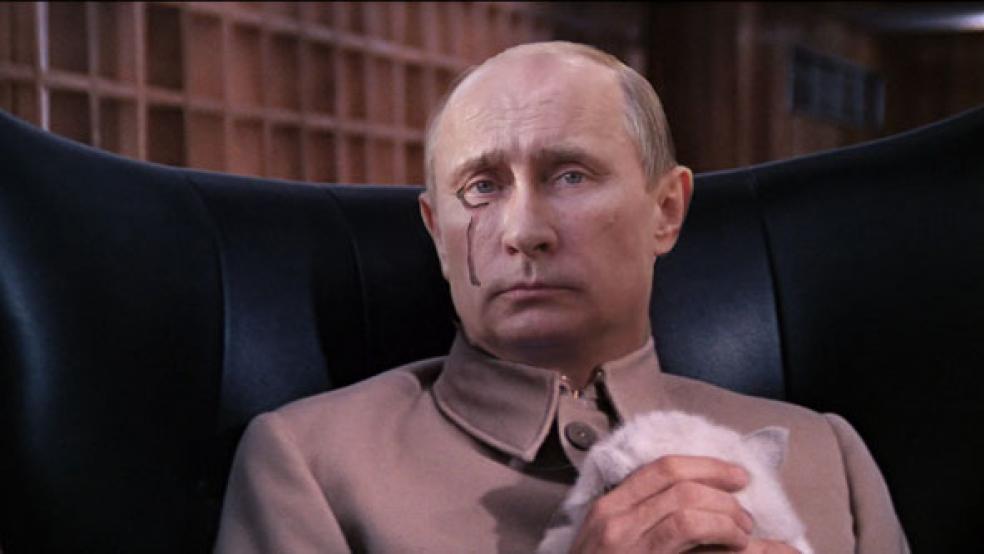The international community continued to isolate Russian President Vladimir Putin Monday for fanning the flames of war in Ukraine. European nations announced a new round of sanctions against Russia’s financial, defense and energy sectors.
“Leaders agreed that the international community should therefore impose further costs on Russia and specifically that ambassadors from across the EU should agree a strong package of sectorial sanctions as swiftly as possible,” UK Prime Minister David Cameron announced after his country, Germany, Italy and France imposed the new penalties.
Related: Let Europe Do the Heavy Political Lift with Putin
Despite Europe’s move, the Kremlin seems unconcerned. Russian Foreign Minister Sergei Lavrov dismissed the penalties even before they arrived, saying earlier on Monday that Russia would “overcome any difficulties that may arise in certain areas of the economy, and maybe we will become more independent and more confident in our own strength.”
After the downing of Malaysian Airlines Flight 17 killed nearly 300 innocent people, many thought Putin would back down and lessen cooperation with Russian separatists fighting with Ukrainian security forces for control of western Ukraine. However, since the plane went down Russian resistance has done the opposite: it’s actually increased.
According to multiple reports, Russia has upped the supply of weapons to the rebels. Putin is also warning Russian business leaders that the economic pinch is about to get tighter.
Yesterday, Putin called defense industry leaders to his home to discuss “risks of a political nature,” according to The Wall Street Journal. He also warned the Russian people, in a nationally televised talk to high-ranking Russian security officials last week, that the West is attempting to harm Russia "in the economic sphere and politically."
Related: Four Ways NATO Could Affect the Ukraine Crisis
Wildly Popular with Russia’s People
If the past is any indication, it’s unlikely the new round of sanctions will be enough for common Russian citizens to turn on Putin. According to a June poll conducted by the Russian Public Opinion Research Center, the percentage of Russians who “believe in the positive political [perspectives] of V. Putin” has increased 1.5 times in the last two years, from 40 percent in 2012 to 69 percent in mid-2014.
The research center found that Putin’s popularity cut across all demographics and was not lagging, despite the crisis in Ukraine.
“This stance is shared by young respondents (67 percent), elderly respondents (71 percent), residents of Moscow, St. Petersburg (76 percent) and rural area[s] (68 percent),” the center found. “Every fifth respondent (20 percent) believes that Putin has reached the peak of his career and he can hardly achieve more than he has now. And only 5 percent think that his influence is declining; the share of such respondents has considerably decreased over a year (…19 percent in 2013).”
Related: Russia, U.S. Edge Toward Economic Warfare
Putin is so popular and such a dominating force in Russian politics that few Russians believe there is any one more capable of steering the country, the center found.
“Today three-quarters of Russians (73 percent) are ready to vote for Putin in the presidential elections, if he participates in these elections: over a year the number of such respondents has increased (from 51 percent in 2013),” the center found. “Half of respondents (54 percent) report that they do not know any politician capable of competing with Putin… and such a person will not appear in the short run (48 percent a year ago).”
Losing Support of the Oligarchs?
As the poll shows, support for Putin among the Russian public is not dying down. However, the real source of power in Russia is the oligarchs, and new reports indicates that they’re tiring of Putin’s standoff with the west, which is hitting them the hardest.
According to the German magazine Der Spiegel [the original story is in German, but an English language report can be found here), German intelligence chief Gerhard Schindler has told the Bundestag that a power struggle is underway between the Kremlin and Russian business leaders.
“According to German intelligence it is quite possible that some of the oligarchs who are worried by European Union sanctions will soon start putting economic interests above political concerns and try to put the brakes on Putin,” Der Spiegel reported.
The German report came out before the new round of sanctions were announced. Many in Russia were assuming that Germany and the rest of Europe would not impose new penalties because of the close ties between the two. Yesterday, this assumption turned out to be false.
"The ruble is losing value, Russia's budget deficit is growing and its economic development is bad. Even the Russian president sees this," Germany Finance Minister Wolfgang Schaüble told Der Spiegel. “Nobody is Moscow should start thinking that Russia can win with its approach."
Top Reads from The Fiscal Times
- Top Marine to Obama: Get in the Fight
- How Obama Lost Friends in Europe and Influence Globally
- Why the United States Spies on Germany





